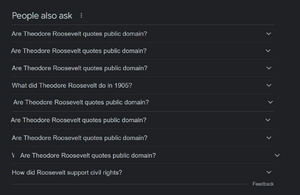User:Ssstephen/Reading: Difference between revisions
No edit summary |
|||
| Line 3: | Line 3: | ||
==Scripts, Grooves and Writing Machines, Lisa Gitelman== | ==Scripts, Grooves and Writing Machines, Lisa Gitelman== | ||
Print culture and non print media evolve in mutual inextricability. The phonograph and contemporary inscriptive forms were deeply dependent upon reworkings of the social and economic relations of textuality, of print culture and print capitalism. They engaged literacy practices in toto, the cognitive and the somatic, the semiotic and the social. They helped question authors and readers as subjects and modify the experienced subjectivities of speakers, performers, publishers, and literates. In doing so they kept intervening into dynamic constructions of private and public, community and difference. p13 | |||
p13 | |||
[[File:Are theodore roosevelt quotes public domain?.png|thumb|alt=roosevelt on copyright 1905 google search edited]] | |||
"Our copyright laws urgently need revision. They are imperfect in definition, confused and inconsistent in expression; they omit provision for many articles which, under modern reproductive processes, are entitled to protection; they impose hardships upon the copyright proprietor which are not essential to the fair protection of the public; they are difficult for the courts to interpret and impossible for the Copyright Office to administer with satisfaction to the public." | |||
[https://en.wikipedia.org/wiki/Copyright_Act_of_1909] | [https://en.wikipedia.org/wiki/Copyright_Act_of_1909] | ||
[https://monoskop.org/images/7/73/Nelson_Ted_1965_A_File_Structure_for_the_Complex_the_Changing_and_the_Indeterminate.pdf] | |||
[https://monoskop.org/images/7/73/Nelson_Ted_1965_A_File_Structure_for_the_Complex_the_Changing_and_the_Indeterminate.pdf Ted Nelson on hypertext] | |||
==Calligraphy for Computers, AV Hershey== | ==Calligraphy for Computers, AV Hershey== | ||
Revision as of 11:10, 23 September 2022
oh this one?
Scripts, Grooves and Writing Machines, Lisa Gitelman
Print culture and non print media evolve in mutual inextricability. The phonograph and contemporary inscriptive forms were deeply dependent upon reworkings of the social and economic relations of textuality, of print culture and print capitalism. They engaged literacy practices in toto, the cognitive and the somatic, the semiotic and the social. They helped question authors and readers as subjects and modify the experienced subjectivities of speakers, performers, publishers, and literates. In doing so they kept intervening into dynamic constructions of private and public, community and difference. p13
"Our copyright laws urgently need revision. They are imperfect in definition, confused and inconsistent in expression; they omit provision for many articles which, under modern reproductive processes, are entitled to protection; they impose hardships upon the copyright proprietor which are not essential to the fair protection of the public; they are difficult for the courts to interpret and impossible for the Copyright Office to administer with satisfaction to the public." [1]

